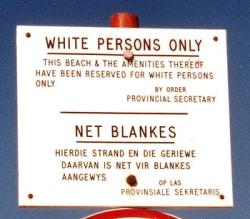
Published date
17 June 1991
For almost 350 years, Black people in South Africa had been subject to exceedingly unjust laws designed, firstly to subjugate them and incorporate their lands into the British Empire, and secondly to turn them in labour reserves that ensured privilege to a White minority.
The vote on 17 June 1991 that repealed the legal framework of Apartheid and began the process that would eventually abolish Apartheid as a whole was bitterly contested as many members of the White electorate sought to cling to the privileges afforded to them under Apartheid. The legal framework in question, consisting of four Acts, namely, the Population Registration Act of 1950, The Group Areas Act, the Land Act and the Separate Amenities Act.
The repealing of these Acts did not include extending the right to vote to all of South Africa's citizens. FW de Klerk, who was President at the time, committed himself to this eventuality as soon as a new constitution was drafted. This process culminated in the first democratic elections in 1994, with Nelson Mandela as the first Black President. The repeal of the legal framework was the result of unified opposition by people from all over the world, who collectively put pressure on the Apartheid government, lobbied for sanctions, and supported the work of the liberation movements and civil society in exposing the evils of the Apartheid system.
References
Google News South Africa Ends Race Labelling: Law's Repeal Eliminates Legal Basis for Apartheid (online), available at:https://news.google.com [Accessed on 18 June 2013]| BBC News Apartheid Laws Scrapped (online), available at: https://www.bbc.co.uk [Accessed 07 June 2010]| NY Times The World; Apartheid: Building it, Undoing it (online), available at: https://www.nytimes.com [Accessed 07 June 2010]